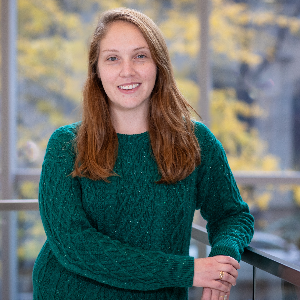
November 2023 Newsletter

November 2023 Newsletter

Student Profile
Kate DeMeulenaere is a third-year PhD student in the Driskill Graduate Program.
DeMeulenaere’s early family experiences led her to be curious about how she could use her skills to improve human health, specifically around neurological disorders.
After receiving her bachelor’s degree in chemistry from Carleton College, DeMeulenaere came to Northwestern to study how glial cells regulate the central nervous system in the laboratory of Murali Prakriya, PhD, the Magerstadt Professor of Pharmacology.
Where is your hometown?
I grew up in Elk Grove Village, Illinois.
What sparked your interest in science or medicine?
Growing up I had a few family members with neurological disorders, and their medications helped to an extent. I saw a few members of my family struggle to find medications that helped them while also not having to deal with severe side effects. I was always interested in how medications worked and if there were ways to improve them without worsening side effects. My interest in science was further nurtured by having great teachers and professors throughout my education. Since junior high, I have been fortunate to always have a teacher or mentor who encouraged me to continue studying math and science.
What are your research interests?
Since coming to Northwestern, I have been interested in how glial cells regulate the central nervous system. I previously worked with astrocytes and thought they were fascinating, and I wanted to continue to investigate microglia and astrocytes and their roles in regulating the central nervous system.
What are you currently working on?
I am currently working to understand the role of store operated calcium entry in microglial effector functions. I worked on a project to understand how microglial Orai1 contributes to neuropathic pain, and we found microglial Orai1 differentially regulates pain in male and female mice. While I continue to work on understanding the role of Orai1 in pain, my overall project aims to understand how Orai1 contributes to microglia reactivity and neuroinflammation.
Please tell us about a defining moment in your education at Feinberg thus far.
I do not know if there has been one defining moment. I think there has been this gradual change that has been defining especially coming back from the pandemic. I joined Dr. Prakriya’s lab in the summer of 2020, and conferences and meetings with speakers were all virtual, which made it difficult to feel a part of a community outside the lab. Over the last year, that has really changed with feeling connected to my department through in-person journal clubs and lectures. As well as, in June I hosted a speaker whose work I have been reading since I started my thesis, which helped with feeling more connected to the field overall.
What do you hope to do with your degree?
Right now, my future path is a little uncertain. I have considered a few different paths. Overall, I hope to continue to work in science to advance our knowledge and understanding of different treatments for diseases and disorders, especially in the central nervous system.